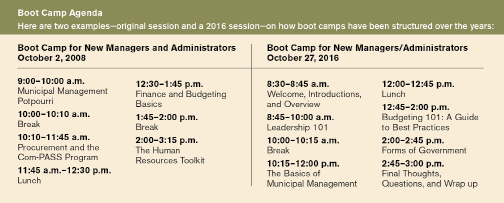
By Kate Fitzpatrick, ICMA-CM, Jeff Nutting, and John Petrin, ICMA-CM
Massachusetts has its very own boot camp for new and aspiring managers—one that evolved after a group of local managers identified a concerning gap in management training.
Several years ago, we were having a conversation about the onboarding process for new managers. We came to the conclusion that there was truly no training available in our state to prepare new managers to be successful, starting with their first day on the job.
Obviously, there are many available educational programs for prospective managers to earn a bachelor's or master's degree in various subject areas, including public administration. State, local, regional, and professional entities also offer numerous training programs that occur on a fairly regular basis that address technical issues of the day or the broad subject of management and leadership.
We came away from our discussion with the feeling that there was no program that addressed the truly helpful hints on dealing with our various constituencies and identified the little things that can get a manager in trouble—or be seen as disingenuous and lost.
We wanted to create a curriculum that would provide prospective managers with the do's and don'ts that are not highlighted in the texts, but that are critical to leading communities. To top it off, we wanted to infuse the training with an emphasis on the Massachusetts' system of town meeting government.
With that goal in mind, we created an outline for a boot camp for managers and pitched the idea to our state managers association, the Massachusetts Municipal Management Association (MMMA). MMMA executive board and staff members agreed that this program was long overdue and eagerly agreed to support it by funding it on a yearly basis with no cost to the participants.
We asked the board members to consider how they became involved in the management association and also how they survived their first days as a local government manager. Many noted that they were grateful their peers contacted them, but wished they could have had an onboarding process that better prepared them for the challenge of leading a community.
The board originally agreed to fund the program at $1,500—an amount that has increased over time to cover meal and refreshment costs for participants. The Massachusetts Municipal Association (MMA), our state league, agreed to provide staff to coordinate the logistics.
We have been operating by seeking free space from communities, presenters who give of their own time, and MMA staff resources. MMA's Senior Member Services Coordinator Denise Baker has been with us since the beginning and has provided the logistical oversite to make the program work. Plus, the funding has now become a permanent line item in MMMA's budget.
The Basics
Our first annual session, creatively titled "Boot Camp for New Managers and Administrators," was held in 2008, and we continue to have a strong showing of approximately 50 participants each year in October. We even took the show on the road in 2012, training other managers how to organize boot camps in their jurisdictions during the ICMA Annual Conference in Phoenix, Arizona.
Participants include newly appointed managers and employees in local government seeking to become managers. We prioritize attendance based on each applicant's career aspirations.
The session runs all day and includes three or four components. Feedback is always solicited from attendees on the aspects of the program that were the most useful, and they are asked to identify additional subject areas.
After so many years, we have a good understanding as to what topics prospective managers need and find helpful. We cycle through these topics, focusing on one at a time for approximately 90 minutes.
The program leaders meet several months in advance to brainstorm topic areas and seek out the presenters. An agenda and logistics are then finalized with staff. MMA sends email notices about the program to the membership and to affiliate groups, and participants are encouraged to attend by colleagues or supervisors.
The application is a simple registration form and is reviewed by staff with questions being addressed by the program leaders.
The most important (and most highly rated) component is the general session that is called the "Basics of Municipal Management." Topic areas include working with selectmen and other boards, residents, press, and staff; how to be a leader in your community; building effective relationships; how to show community pride; developing a personal work style; and developing a support network.
There are six managers with varying degrees of experience delivering the information in a fast-paced, informal, and often humorous way. We have always tried to blend various demographic factors when determining the group of presenters. These factors include gender, community type and size, experience, and management styles.
Interaction with the attendees is encouraged. Presenters are familiar with each other and the repartee among them has become entertaining, with great examples and stories provided for the various points being made.
In addition to the general session, components include leadership, personnel management, collective bargaining, capital planning, finance, and other topics as we deem appropriate.
We also recruit topic area experts each year to address the basics that are needed for participants to be successful as they take on the position of manager for the first time. Topic area experts have often joined us for many years, and some have started participating in the general session.
Many participants attend a second year. We often hear that this is the most entertaining and informative session that managers have attended. Established managers have seen the impact and have been more than willing to participate.
The reviews of our casual approach to presenting information has played an important role in the word getting out that the boot camp is a great experience, as well as a place for us to get the first look at potential candidates for management-level positions.
A key factor to our success is the stories we tell in order to make our points. One manager will talk about the elderly woman he assisted with a public works issue and how he was happy to meet her at her house.
Another one speaks on how stopping at a public works job site to discuss the project is routine, while another manager only feels comfortable stopping at a site with a supervisor. Often, we are highlighting the differences in how we may individually handle a problem based on our personal styles.
We stress that participants must filter what we are saying to fit their own styles. When discussing such other areas as ethics, we make it clear that options are limited. Stories include having to address sensitive areas related to elected officials and their families.
Handling an enforcement order, for example, regarding the daughter of an elected official and not knowing about the relationship, hits home the importance of discretion and how a person should never make disparaging comments in the process.
Another maxim? Everyone is related to everyone else in local government!
A Boost to Networking
One of the outcomes of the program is that people get to meet each other and networks are developed. We often receive calls from attendees who have used us as a resource in pursuing their own careers, and then have become colleagues and friends as their own careers have moved forward.
This aspect of recruiting and networking is truly needed in the Massachusetts environment, as many of us who have spent years in the management profession are in the process of retiring and moving on to new adventures in our lives.
Participants from boot camp sessions have gone on to take senior management positions. Nina Nazarian, town administrator of Princeton, Massachusetts, who also was a presenter in a later boot camp, states that the training is valuable for individuals entering or planning to enter local government management.
"In recalling the boot camp I attended," she says, "it provided me some of the foundational aspects to prepare for this career. It also provided an introduction to a small group of managers who I know I can count on if I need guidance or insight in the field. I am really proud to be part of an association that offers this no-cost training opportunity."
Adam Chapdelaine, town manager of Arlington, Massachusetts, attended the first boot camp and has also become a presenter. He says, "Boot camp provided the perspective and insight of a decades-long career in a fun and interactive one-day session.
"It's easy to learn how to balance a budget or draft a policy from a textbook, but learning to lead and manage a people-intensive organization is far more challenging. Boot camp gave me and other aspiring managers a head start on learning these lessons before facing them in the real world."
Our core group of managers has remained constant over the past 10 years, but it now is changing as we prepare our succession plan. We have decided to transition the stewardship of the program to a group of managers who will be committed to maintaining the program in future years. It certainly has been a fun program to plan, coordinate, and present.
We have often gotten much out of it ourselves. We have found ourselves trying out ideas shared with each other and from the audience. Ultimately, our presentations always stress that not every idea is for everyone and that you need to be true to yourself.
We have also stressed that what is said in boot camp stays in boot camp. We try to get as personal and honest as possible to let the participants see the emotion that goes with the profession.
Is This Program Needed Elsewhere?
This program has been successful in our state, and we are willing to provide any material and information to managers in other states and countries who may see the same need and be interested in a similar program.
The material can easily be adapted to fit the needs of other local governments. It really just takes the commitment of a few managers who support outreach to potential attendees.
Our success has been the fact that we have been able to have fun with this process. We have always looked forward to the annual event, as we get as much out of it as the attendees.
Sample Tips from Seasoned Managers
Here is some of the management advice that is shared at boot camps:
• Treat all elected officials the same.
• Avoid personal relationships with elected officials. Keep your distance.
• Try to say yes.
• Be at community events. Showing up is half the battle.
• Remember that there are no secrets in the "big house" (i.e., local government buildings).
• Make sure you understand that you work in a community and not just a town or county.
• Get out of the office. Do not isolate yourself.

Kate Fitzpatrick, ICMA-CM, is town manager, Needham, Massachusetts (kfitzpatrick@needhamma.gov). Jeff Nutting, is town administrator, Franklin, Massachusetts (jnutting@franklin.ma.us). John Petrin, ICMA-CM, is town administrator, Burlington, Massachusetts (jpetrin@burlington.org).
New, Reduced Membership Dues
A new, reduced dues rate is available for CAOs/ACAOs, along with additional discounts for those in smaller communities, has been implemented. Learn more and be sure to join or renew today!
